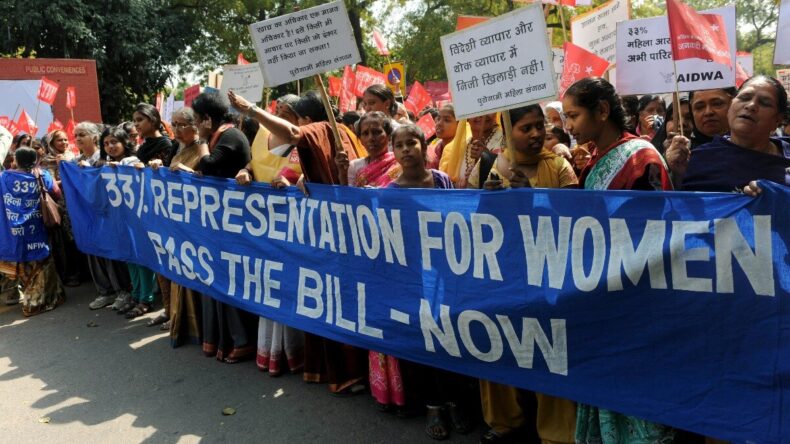
The Government has presented the ‘Nari Shakti Vandan Adhiniyam’ in Lok Sabha.
Women’s reservation bill introduced, PM says September 19 ‘historic day‘.
In a historic move, the Indian government took a significant step towards achieving gender parity in political representation by introducing the ‘Nari Shakti Vandan Adhiniyam’ in the Lok Sabha on September 19. This landmark bill, which aims to reservation of one-third of seats in the Lok Sabha and State Assemblies for women, has been a longstanding demand and marks the first legislative proposal to be introduced in the newly inaugurated Parliament building.
The bill, which has been in the works for an astonishing 27 years, was finally cleared by the Union cabinet, signifying a momentous leap towards greater female participation in policy-making at both state and national levels. Sources have reported that the cabinet’s decision to endorse the reservation of 33 percent seats for women was a crucial milestone, although an official announcement from the government is yet to be made.
The anticipation surrounding this development was heightened by Prime Minister Narendra Modi’s earlier statement, hinting at the possibility of ‘historic decisions’ being made during this special parliamentary session. Key meetings between prominent figures such as Commerce and Industry Minister Piyush Goyal, Parliamentary Affairs Minister Pralhad Joshi, Home Minister Amit Shah, and BJP chief JP Nadda further fueled speculation about the nature of decisions to be made.
Among the speculated outcomes were not only the reservation for women but also proposals related to Other Backward Classes, the concept of “One Nation One Election,” and even the potential alteration of the country’s name. As the cabinet meeting concluded, hopes for clarity were met with continued suspense, as the customary post-meeting briefing was conspicuously absent. Shortly after, authoritative sources confirmed that the buzz surrounding the approval of the women’s reservation bill was indeed accurate.
Congress’s communications in-charge, Jairam Ramesh, expressed his party’s long-standing support for the implementation of women’s reservation. He welcomed the reported decision of the Union Cabinet and emphasized the importance of consensus-building through an all-party meeting, rather than operating in secrecy.

The bill, initially drafted in 2008, had remained in limbo since its passage in the Rajya Sabha in 2010, as it had never been presented in the lower house. While both the BJP and the Congress have consistently advocated for the bill, it faced opposition from other political parties, with some advocating for a quota for backward classes within the proposed women’s quota.
Leaders from the Opposition, as well as factions within the Nationalist Congress Party led by Ajit Pawar, had vigorously advocated for women’s reservation ahead of the parliamentary session. This push was echoed in the all-party meeting held prior to the special session, indicating a broad consensus on the importance of this legislation.
The matter was also raised during the inaugural proceedings of the special session. Congress chief Mallikarjun Kharge underscored the stark gender disparity in parliament, where only 14 percent of members are women, and in legislative assemblies, where the figure drops to a mere 10 percent. In response to criticism from the BJP, Nationalist Congress Party’s Supriya Sule provided a historical perspective, highlighting that trailblazing figures like India’s first woman president, Pratibha Patil, and first woman prime minister, Indira Gandhi, were both from the Congress party. She emphasized that the Women’s Reservation Bill, originally brought forth by the Congress, faced challenges in garnering sufficient support for passage.













